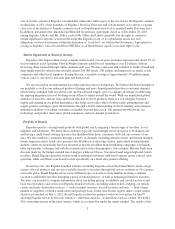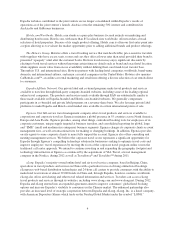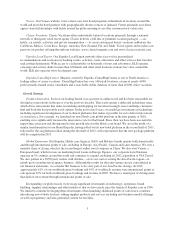Expedia 2012 Annual Report Download - page 19
Download and view the complete annual report
Please find page 19 of the 2012 Expedia annual report below. You can navigate through the pages in the report by either clicking on the pages listed below, or by using the keyword search tool below to find specific information within the annual report.• Reduced access to discount airfares;
• Travel-related strikes or labor unrest, bankruptcies or liquidations;
• Incidents of actual or threatened terrorism;
• Periods of political instability or geopolitical conflict in which travelers become concerned about safety
issues;
• Natural disasters or events such as severe weather conditions, volcanic eruptions, hurricanes or
earthquakes;
• Travel-related accidents or the grounding of aircraft due to safety concerns; and
• Health-related risks, such as the H1N1 and avian flu outbreaks.
Such concerns could result in a protracted decrease in demand for our travel services. This decrease in
demand, depending on its scope and duration, together with any future issues affecting travel safety, could
significantly and adversely affect our business, working capital and financial performance over the short and
long-term. In addition, the disruption of the existing travel plans of a significant number of travelers upon the
occurrence of certain events, such as severe weather conditions, actual or threatened terrorist activity or war,
could result in the incurrence of significant additional costs and decrease our revenues leading to constrained
liquidity if we, as we have done historically in the case of severe weather conditions, provide relief to affected
travelers by refunding the price or fees associated with airline tickets, hotel reservations and other travel products
and services.
Our business depends on our relationships with travel suppliers and travel distribution partners.
An important component of our business success depends on our ability to maintain and expand
relationships with travel suppliers and GDS partners. A substantial portion of our revenue is derived from
compensation negotiated with travel suppliers, in particular hotel suppliers, and GDS partners for bookings made
through our websites. Each year we typically negotiate or renegotiate numerous long-term airline and hotel
contracts. No assurances can be given that travel suppliers or GDS partners will not further reduce or eliminate
compensation, attempt to implement multiple costly direct connections, charge travel agencies for or otherwise
restrict access to content, credit card fees or other services, further reduce their ADRs or decide not to make their
travel inventory available to us, any of which could reduce our revenue and margins thereby adversely affecting
our business and financial performance. For example, a number of airlines now charge for checked baggage,
food, beverages and other services. GDSs currently have limited technology to incorporate these elements into
our product selection, impacting our product display and comparability with the airlines own sites or other
channels that show this content detail. In late 2010, American Airlines began to pursue a new distribution
strategy requiring online travel agents to agree to connect directly to American Airlines’ systems, rather than
through GDSs. If other airlines pursue a similar distribution strategy, it could reduce our access to air inventory,
reduce our compensation, result in additional operating expenses related to the development, implementation and
maintenance of the necessary technology systems, increase the frequency or duration of system problems and
delay other projects.
We rely on the value of our brands, and the costs of maintaining and enhancing our brand awareness
are increasing.
We invest considerable financial and human resources in our brands in order to retain and expand our
customer base. We expect that the cost of maintaining and enhancing our brands will increase due to a variety of
factors, including increased spending from our competitors, the increasing costs of supporting multiple brands
and the impact of competition among our multiple brands, expansion into geographies and products where our
brands are less well known, inflation in media pricing including search engine keywords and the continued
emergence and relative traffic share growth of search engines and metasearch engines as destination sites for
travelers. Our efforts to preserve and enhance consumer awareness of our brands may not be successful, and,
13
























